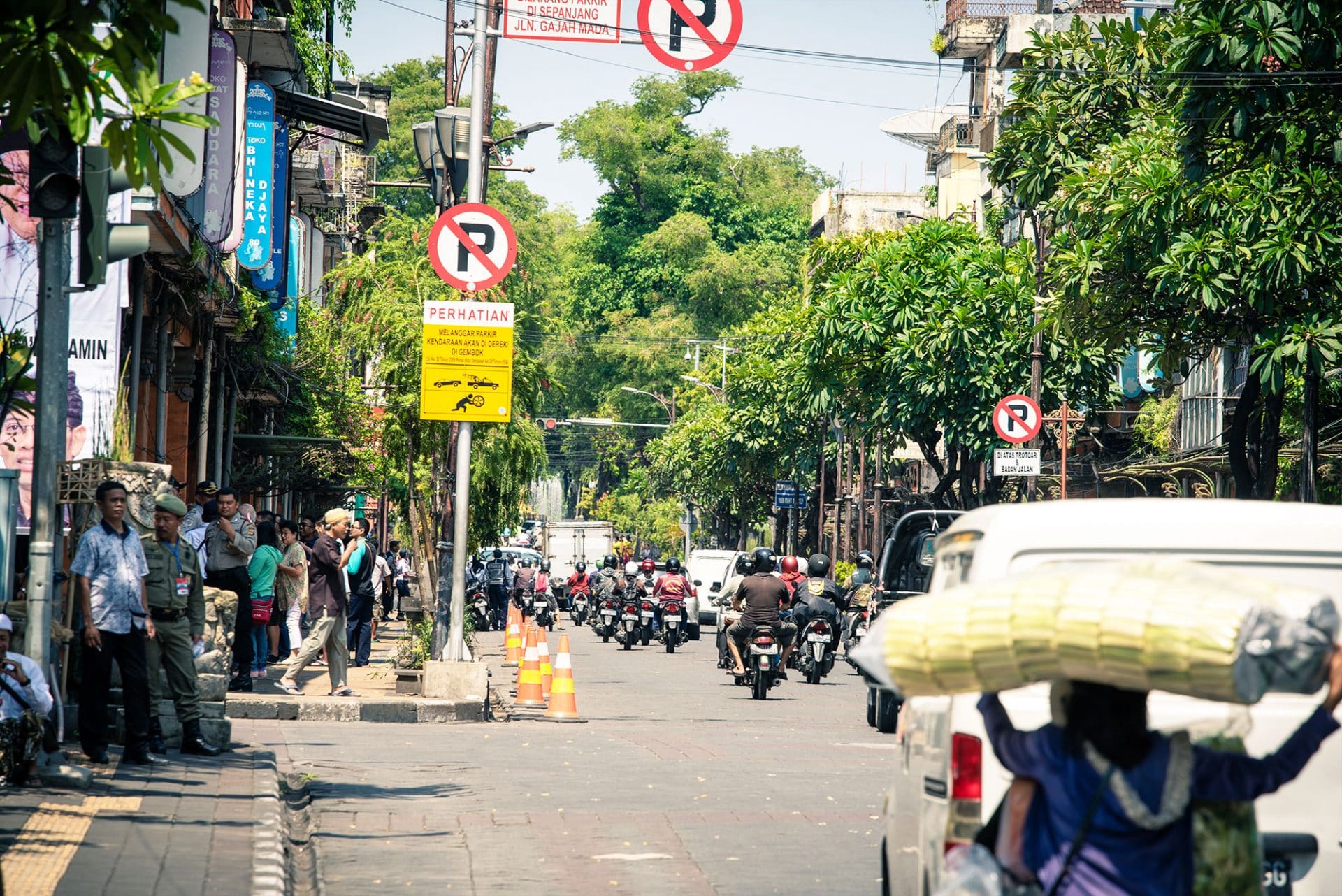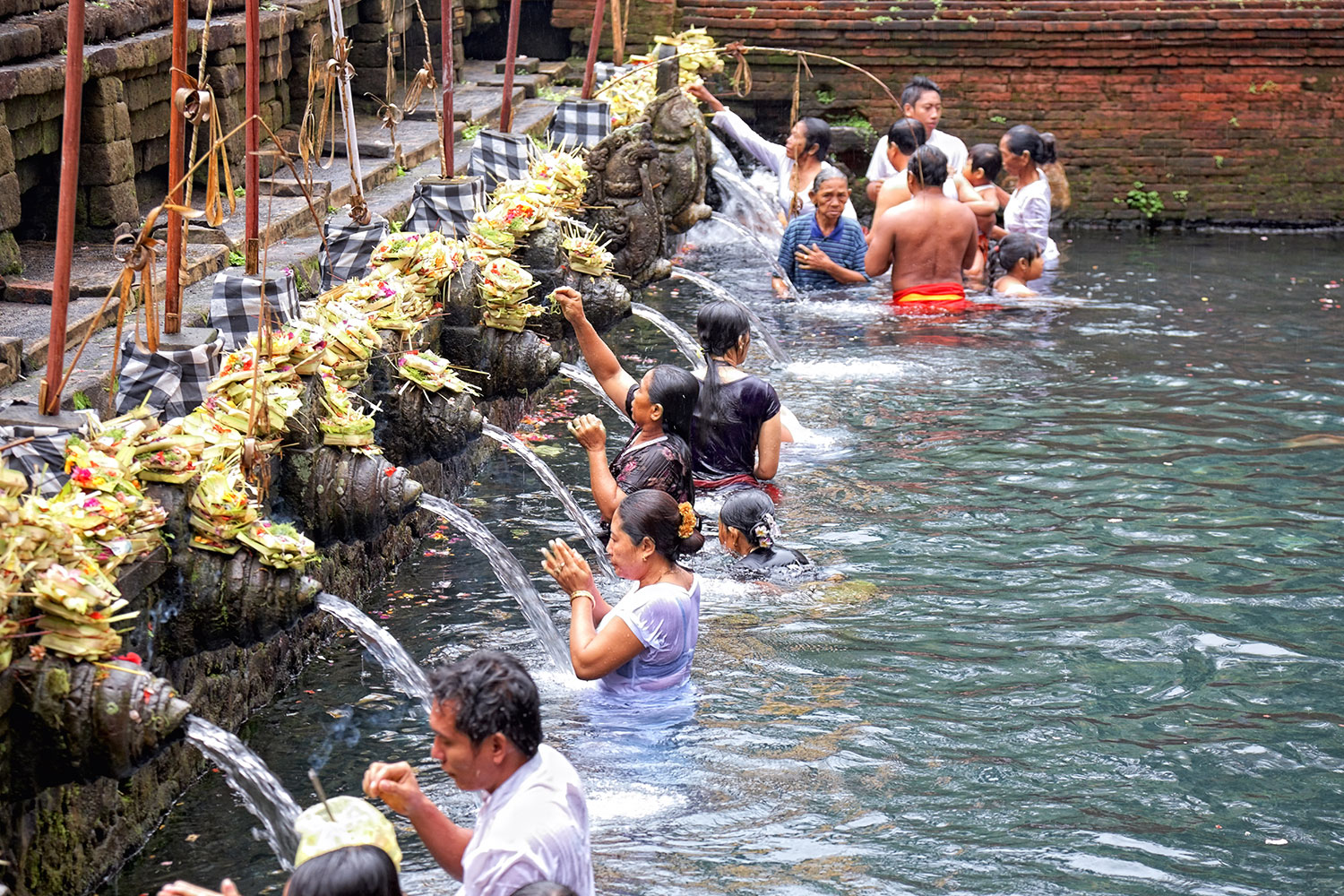It’s Hard to Make Counselling Sessions Feel Like Safe Places In Bali
Photo: Bernard Hermant/Unsplash
A psychology clinic | 3,160 words
Translated from Bahasa Indonesia by Dan Benjamin
There is no sound apart from the hum of an air-conditioning unit affixed to the ceiling. The silence makes me want to leave the room. But I need to wait, to see if the client comes to the online counselling session. I don’t stop looking at the clock as I sit through the leniency period for lateness. The clock’s ticking seems shriller than normal, the movements of the hands slower. Finally, time’s up – the client is a no-show.
After closing GoogleMeets, I report to my colleague the client’s inattendance. The name is excised from our records but not from my mind.
I prefer to think the appointment was simply forgotten. That’s the best-case scenario I can conceive among the myriad reasons that might cause someone to not come to a session. Like being forbidden by their families. Or scared of becoming an object of gossip, called crazy or stamped as someone of weak faith.
After Covid-19 spread, counselling, therapy and other mental health services moved online. It should make counselling easier because virtual sessions can be scheduled easier, without a need to leave the house – but the flip side is that clients can be discovered by the people living around them that they’re in therapy. All things mental health and psychology-related have such acute stigma attached to them that it’s difficult to make a counselling session feel like a place of safety here.
Online counselling’s difficult. We do therapy sessions for children with special needs via laptop: the kids are at home with their parents, the therapists in our psychology clinic’s practice room. The kids can’t follow our instructions, then throw trantrums and cry; the parents are confused over how to calm them down. It’s not easy to give instuctions to people with special needs online: the specifics of the activities we propose as part of therapy are hard to convey.
For many people in Indonesia, especially those who live outside big cities, psychology’s a taboo concept, let alone mental illness. Years ago, when I was at university and some friends asked what I was studying, when I said Psychology, they thought it meant I could read peoples’ thoughts.
People often ask why I chose to major in Psychology. I tell them because of the good career opportunities. That’s not the real answer. It was because I want to know what prompts human beings to become the people they are. What I mean is, humans have radically-different individual natures. There are people who act with the goodness of angels, and there are people cruel enough to explode a bomb in a crowded place.
One moment that made me question just how humans develop and become who they are was the time I first came to know the word ‘terrorist’. I learnt that word with the 2002 Bali Bombing. I first saw the news while at a mall with my family in Sesetan in South Denpasar. An electronics store displayed giant TVs: on the screens were broadcasts showing reporters against backgrounds of flames. A crowd gathered in front of the TVs, and the space came to life with surprised exclamations and straitened facial expressions. I, who’d just entered first grade, didn’t understand the substance of the words. I just looked at the fire in the dark night, burning amid the skeletal remnants of a building. The news kept going and going. Roadsides emptied-out, shops shuttered earlier than normal, police were on the move everywhere, and tourism was paralyzed instantly, similarly to Covid.
Years later I went to the Bali Bomb memorial at Kuta as part of a high-school class trip. It was the first time I’d spent time there rather than just passing through, and I found myself thinking: why do some people become terrorists while others become humanitarians, like those doctors in the hospitals who treated the injured or the locals who helped at the scene of the explosion?
***
I work in a psychology clinic in Denpasar whose name means ‘house of light’. It’s new, built two years ago: it opened a few months before Covid-19 was first detected in Indonesia. The centre features a lot of purple and pink – even the main sign out the front is coloured purple. Though there are two separate buildings we only actually use one, which comprises just a single space and has a door made of glass. It’s a space for all activities: counselling sessions, therapy sessions, and our meetings.
The centre is in a residential area and is hidden down a narrow alleyway, more-easily accessed by motorbike than car, and flanked by small warung shops to left and right. In the morning a market overflows and engulfs the lane, obstructing any vehicle whatsoever that attempts to pass through. The vendors always leave things behind, like stray vegetables, which remain scattered along the alley.
I work with seven others. Three are psychologists, whom I consider mentors. All the psychologists are women, one of them in advanced pregnancy. In spare moments they put on training sessions or workshops for their four assistants. Among the assistants I’m the oldest, the others graduated two years ago. Rather uniquely, we’ve got a man on staff too: by coincidence he’s a videographer, and we rely on him to make guaranteed great-quality video for our social media. We don’t just do counselling and therapy but also design educational content and do projects in the local community.
But there was nothing I could do. I couldn’t even point out those medical symptoms that so matched with that man’s behaviour, because the topic is sensitive, and everyone was already convinced he was a victim of black magic. If I had spoken up I would have been called rude, accused of poking my nose into other peoples’ business and (here it is again) lacking in religious faith.
I can’t talk specifics about counsellors and clients because of client confidentiality. But one of my seniors says that every client has gone through a long journey to get to our clinic, and that the hardest part is to begin. If someone attends a session, they’re already halfway to recovery.
Some come by themselves, others are accompanied. If a client and staff member meet at the entrance of the counselling space there’s a moment filled with awkwardness, as if we need to adjust ourselves to each other’s presence. Peoples’ very existence here can feel ethereal, as if there are unwritten covenants instructing – you don’t see me here. Don’t tell anyone.
A counselling session done via telephone: the client is blowing up. He says counselling is ineffective because the root cause of the problems is money. If they had money, all stresses would disappear. Thus counselling is counter-productive because it’s expensive. Although his session happens to be free.
At such times, I listen while praying over and over to keep a hold of myelf. To not let it get to me.
***
To be born a Balinese means being born deeply-enmeshed in the mystical, in an environment thick with black magic. We all grow up with these things around us, even those of us living in big cities. The experiences take the form of stories we hear, myths we come to believe, and a set of unquestioned habits and practices. Sometimes, we ourselves or the people closest to us experience these things directly.
In Bali many think that mental illness is a curse which happens because sufferers were insufficiently-diligent at banten – giving a ritual offering to the spirits – or are otherwise being reprimanded by ancestors. The layperson’s understanding of schizophrenia, for example, is that the sufferer has been possessed by an evil spirit or that they have disobeyed an order from an ancestor and have lost their minds as punishment. Similarly, people think mental illnesses can be caused by black magic ‘sent’ out of envy or because the sender is being harassed by a Leak, a giant beast in Balinese mythology, large-eyed, sharp-teethed, and with a tongue hanging down to its legs. People who are jealous will send black magic to sap the vitality and sanity of rivals. People don’t really know about mental health and mental illnesses: when talking about them, they tend to link them to the supernatural.
In college, my psychology lecturer discussed mental illness and kerauhan, a phenomenon that occurs at religious events when individuals become incarnated as a medium of the gods, coming to possess their strength and embody their values – he asked us one by one how we might appraise the difference. Some of my classmates laughed at this comparative analysis. Others were reluctant to participate because commenting on the topic felt altogether too close to commenting on religion itself. I didn’t say anything, because I didn’t know what to think.
I live in central Denpasar, in a district that sits just opposite a popular just-contructed mall and nextdoor to several foreign consulates, and only ten minutes to Sanur beach. It’s a comfortable area, very well-connected. It takes about half an hour to travel from there to the clinic: usually I go by motorbike. Sometimes, the feeling is of passing through a looking-glass. Where I work, all symptoms of mental illness are treated with sober attention and without judgement, whilst constantly referring to the needs of each client. Where I live, although it’s in the centre of a major city, and enjoys seamless access to information, the situation is very different.

Until three years ago, there was a man who had become infamous in the area I live: his nickname was ‘Bli Man’. He always looked grotty, wearing dishevelled clothes, and he went around asking for free food at stalls, sometimes also for a thousand rupiah (about seven cents) or a smoke. That was what he did during the day: he just walked back and forth along the sidewalks, talking to himself, sometimes making extravagant hand gestures into the wind as if communicating with somebody. Bli Man was known as a person who had lost his mind after being sent black magic by a person who envied his family because they were rich.
When I was young I was so scared of him. I always avoided him whenever I stepped outside my house. Only when I entered university did it hit me that the traits he displayed were symptoms found in psychological diagnostic books.
But there was nothing I could do. I couldn’t even point out those medical symptoms that so matched with that man’s behaviour, because the topic is sensitive, and everyone was aleady convinced he was a victim of black magic. If I had spoken up I would have been called rude, accused of poking my nose into other peoples’ business and (here it is again) lacking in religious faith.
Bli Man was not brought to a medical centre until the day he died. That knowledge caused in me an ugly feeling, and a sense that I was not a person who was useful.
***
In Bali the solution that’s most popular for supernatural disturbances is melukat, a ritual of spiritual cleansing, usually done by bathing yourself in holy water and leaving a banten offering.
I have performed melukat, after experiencing symptoms of burnout. There was a time when I felt a deep, prolonged fatigue and my mood was unsettled and cloudy, because of the pressures of work and study – I was brought to tears by it. All this was found out by a relative, and I was then invited to melukat. My parents, far from prohibiting it, instead said to me that I should do it, even though I didn’t want to.
Go I did, accompanied by two relatives. They didn’t actually tell me what area we were headed to. We took a car and left Denpasar, heading toward Klungkung. Throughout the trip I was haunted by awkwardness and nervousness, and my fingers began to scrape at the paint on my fingernails until streaks of it had worn off. The road we were on narrowed and narrowed, indicating how deep in the hinterland the village we were headed for was. We passed a market famous because twin giant trees flank it, sacred trees of ancient age. Their trunks were blanketed by black and white fabrics and they emitted aromas of incense that blended with the smoke from the market.
Our car parked in an empty field, then we climbed a stone staircase that took us to the melukat grounds. The sound of running water in a pool towards the rear of the complex was audible from the front terrace.
Not far from the large ornate stone towers that loomed over either side of the entrance path was a house on stilts, its floor made of wooden planks that gleamed without blemish.
The babble of running water brought a coolness and natural quietness. Everyone present talked in low voices as they greeted and smiled at each other. The tendrils of tropical trees acted as an umbrella over the narrow trail leading towards the pavilion where we were to pray. Foliage provided shelter in every corner of the complex. It felt impossible that anyone here could feel claustrophobic.

I had come without any expectations. For fifteen minutes I sat in a balè, a sort of hut, waiting around while helping pack dry snacks into a plastic bag. My relatives were visibly enjoying chit-chatting with other visitors. I just listened. Soon, my ‘session’ began. In the balè I met a tetua, a priest, who was wearing all white and sitting cross-legged before a long low bench. We began to talk, and I answered in a very formal Balinese which I spoke clumsily, with mistakes. Standard Bali questions followed: my name, where I lived, what my parents did for work, how many siblings I had. The discussion changed slightly when I said that I had three siblings and all were girls. I saw a smile appear full of empathy – or closer to pity – when I said this.
The priest then told me the following: normally, after the birth of a first girl, the next child is a boy. Thus if a mother in this situation goes to a clinic and finds her feotus is a girl, she very possibly will be sad and disappointed. That in turn will influence the emotion of the foetus and can continue afterwards to influence the baby, the child, even the adult.
I am the second child of three girls. Amid a society that entrusts the continuation of family lines only to sons, I’m already very familiar with this type of sentiment. My response was to smile and nod my head in acknowledgement. I did not know what I ought to say.
Shortly afterwards, another priest ‘read me’, said I was intelligent, but then soon after said I was lazy because I was not showing my hands in the way I was supposed to. We were sitting opposite each other, and I was cupping both my hands tightly in my lap and pressing all my fingers together to try to hide the streaked nail paint that I had scratched off on the journey. I was trying to hide it because my fingers looked unclean, which would give an impression of impoliteness. At this rebuke, too, I did not respond at all, just smiled and nodded.
After that I was asked to sit with my back to a stove in an adjoining kitchen area, which they said was beneficial, because warming my back would stave off illness. Finally, I was directed to wash my hair beneath the running water by the pool. After I had done this evening had already come, and my head suddenly felt so sharply cold it was like a sting. We prayed, then together we went home.
The experience did not make me feel better. I continued to feel bad.
Finally I phoned my psychology lecturer who also practiced at a clinic – by then, an escalating sense of hopelessness had me telephoning secretly from my room. She said that a feeling of guilt had come over me because melukat had failed to improve me. She said I did not need to feel any such guilt. My lecturer told me that every person’s coping mechanism is different. Melukat can help some people, but it can’t hope to apply to all people and all conditions. What would really be problematic was if all people were forced to melukat to resolve their mental health issues. Let alone if any association was inferred between their suffering and a lack of religious faith.
I didn’t tell my family that it was not melukat that finally made me feel better. If I had told them it was the counselling which I entered into that helped me recover from burnout, I would be afraid of people calling me rude and tulah (cursed), because the statement would amount to a criticism of melukat, even if indirectly.
And if I had told them that melukat had helped – well, but I know that’s not what happened. The feeling is like having something obstructed inside me, like a fish-bone lodged in a throat.
Frankly, just writing this is making me uneasy. If at some point a relative sees this, recognises me, and spreads the word about what I’ve written, what then? I can guarantee – once again – those relatives will appraise me as faithless and insubordinate.
After going through those two utter opposites, melukat and counselling, I feel there’s a fundamental difference between them – and the difference has nothing to do with the beliefs themselves that underlie each approach. I am neither belittling or exalting either, on any level. But the difference is like that between talking to a friend and talking to a figure of authority. During counselling, both parties tend to be seen as equal: the client can rebut, respond, debate and explain with the counsellor. In melukat sessions, there’s not much space for that. Not because it’s banned, per se, but because of the awkwardness and the perception of rebelliousness that would result if you queried the advice of priests.
My psychology clinic colleagues and I all know the issues we face, these questions of belief, faith, and stigma. They don’t tell me I should stop questioning: what they say is that the answers to the questions I have will come only through a long process. When I confided in them, they said it was better that I focus on becoming a better counsellor, a more diligent listener, to keep trying to identify my biases, things in that vein. And that’s what I’m trying to do. Every morning I head out from my neighbourhood, that continues to go about its business as if Bli Man never existed at all, and head towards the clinic, which views symptoms of mental health difficulties with open hands and careful appraisal. Every morning, I try to find a meeting-point between these two places where I live my life, and also between the different elements inside of me.
© Made Ayu Dyah
English translation © Dan Benjamin



